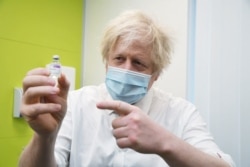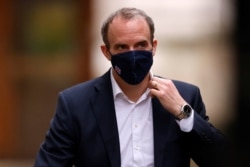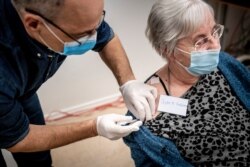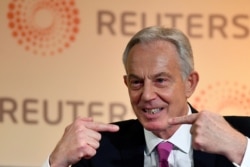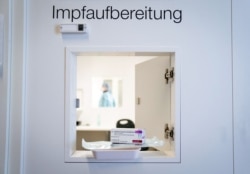The prospect of vaccine passports is getting closer in Europe — with more governments considering introducing them not only for travelers, but also to help reopen bars, restaurants and concert halls.
Asked whether the introduction of vaccine passports is likely, Britain’s prime minister, Boris Johnson, told reporters Monday some international travel likely would require proof of coronavirus inoculation.
“Some countries, clearly, are going to be wanting to insist that people coming to their country have evidence of a vaccination — just as people have insisted in the past that you have evidence you are vaccinated against yellow fever or other diseases,” he said.
European governments have been split about whether to endorse a system of vaccine passports, but the travel, tourist and hospitality sectors are desperate to get business going again and say they can’t afford another lost summer.
But civil libertarians worry the continent will be divided along a new haves and have-nots fault-line, and this week Britain’s foreign secretary, Dominic Raab, provoked a political uproar when he told a radio interviewer that Britons may have to present evidence of vaccination to enter bars and grocery stores.
“It’s something that hasn’t been ruled out and it’s under consideration, but of course you’ve got to make it workable,” Raab said.
His comment earned a sharp rebuke not only from civil libertarians but from Conservative lawmakers.
“For everyday life, I don’t think you want to require people to have to have a particular medical procedure before they can go about their day-to-day life,” lawmaker Mark Harper said. “That is not how we do things in Britain.”
Elsewhere in Europe, more governments are exploring the idea of introducing vaccine passports — at least for travel. Denmark’s finance minister, Morten Bødskov, last week raised the prospect of inoculation passports being introduced by the end of the month, which would make the Scandinavian country the world's first to do so. Denmark is currently under a strict pandemic lockdown.
“Denmark is still hard hit by the corona pandemic,” he said. “But there are parts of Danish society that need to move forward, and a business community that needs to be able to travel.”
Estonia is working with the World Health Organization (WHO) on a project to create standardized electronic vaccination certification the country hopes could become the “gold standard” and attract global recognition.
Marten Kaevats, an adviser to the Estonian government on technology, told AFP the primary challenge for a globally endorsed system is to ensure that anyone checking the certificate can “trust the source.” The Estonian solution is looking at producing a digital version of the extant paper yellow-card used to prove yellow fever vaccination.
Estonia, a tech trailblazer that’s been a pioneer in government e-services, isn’t alone in exploring a possible a digital vaccine passport program that can command global respect. Britain, Greece, Iceland, Hungary, Lithuania and pharmaceutical companies have all announced initiatives. Some are looking at using QR codes, or even facial recognition technology.
The challenge is further complicated by the different data-systems countries have for keeping electronic health records that are not mutually recognized across borders. And most countries don’t even maintain digital health records.
Kaevats told AFP it is unlikely that a global digital ID will emerge in the coming months, and it is more likely there will be a muddling through in a messy and arbitrary way with a mix of paper and electronic certificates appearing.
Greece has urged the European Commission to shape a common understanding on how a vaccination certificate should be structured, so it could be accepted in all member states. But the EC is struggling — and officials say it becomes even more complicated when trying to fashion a framework for the recognition of certificates that might be developed by countries outside the European Union.
There also are disagreements over what rules should apply to travelers who received vaccines not approved by the European Medicines Agency (EMA). Experts at the WHO have withheld recommending vaccination passports for travel, deterred by fears of a messy and dispute-filled implementation and worried by the insufficient guarantee that those who have been inoculated can’t spread the virus, if they still contract it themselves and are asymptomatic.
Some international airlines, including the Middle East’s Etihad, which has become the first airline to vaccinate all operational crew, say they already are planning to require passengers to produce pre-travel inoculation documentation. Some airlines are planning to add to their apps a requirement for passengers to add details of their vaccination before being able to book.
Growing backlash
But vaccine passports and the emerging idea of inoculation certification being needed to enter restaurants, bars, concert halls and sports stadiums also is prompting a backlash from rights and privacy campaigners. They say that would be unfair when there is not universal access to vaccines and that such plans would be a backdoor way to make vaccinations mandatory, infringing on the freedom of those who refuse vaccines.
In Britain, rights campaigners reacted with dismay Tuesday when the country’s vaccines minister, Nadhim Zahawi, told the BBC the government would not forbid businesses from pressing ahead with their own inoculation certification standards for customers and even for employees. “It’s up to businesses what they do,” he said. Zahawi previously had rejected the idea of vaccine passports, saying that the use of them would be “wrong” and “discriminatory.”
British ministers appear to be in a quandary, with no firm agreement within the cabinet about the way forward. While Foreign Minister Rabb has openly touted the possibility of vaccine certificates being required for domestic in-country activities, other ministers have briefed against the idea, saying they are sure there will be no formal endorsement of vaccine passports for domestic use.
While Johnson said Monday that Britons should not be expected to present paperwork to enter a pub, he shied away from discussing whether care homes and other businesses should be able to insist employees be inoculated.
Tony Blair, the former British prime minister, who has been campaigning for a global coronavirus vaccine passport system, said this week, “We have the technology that enables us to do this securely and effectively. The need is obvious.” He added, “The arguments against it really don’t add up.”
But critics say the result will be to divide people, and countries, between vaccine haves and vaccine have-nots, affecting the developing and poor nations much more than rich ones. Some experts estimate that most African nations are unlikely to see mass vaccination programs until 2023 or even 2024.
Germany’s ethics council, an independent government-funded body, has urged that no special conditions be accorded to the inoculated. It has said much is still unknown about whether vaccinated people can still spread the virus, and that introducing privileges for the vaccinated could prompt civil unrest with the have-nots feeling they are being elbowed aside.
France’s European affairs minister, Clément Beaune, has firmly objected to vaccine passports. “We are very reluctant,” he said. “It would be shocking, while the campaign is still just starting across Europe, for there to be more important rights for some than for others.”





